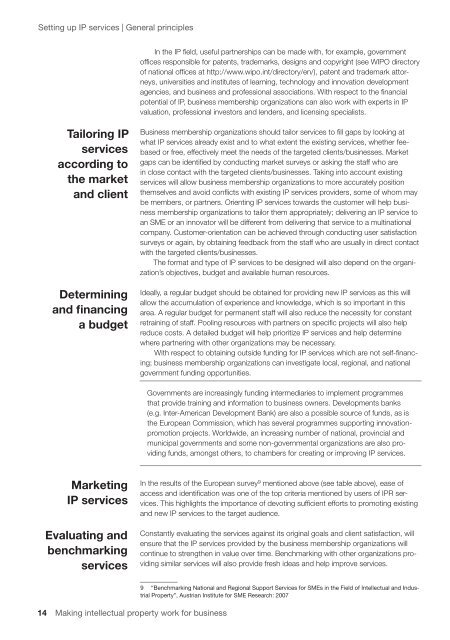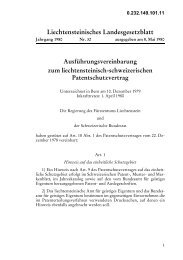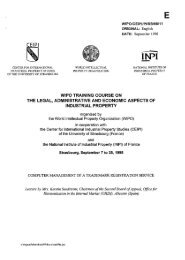Making intellectual property work for business - World Intellectual ...
Making intellectual property work for business - World Intellectual ...
Making intellectual property work for business - World Intellectual ...
You also want an ePaper? Increase the reach of your titles
YUMPU automatically turns print PDFs into web optimized ePapers that Google loves.
Setting up IP services | General principles<br />
Tailoring IP<br />
services<br />
according to<br />
the market<br />
and client<br />
Determining<br />
and financing<br />
a budget<br />
Marketing<br />
IP services<br />
Evaluating and<br />
benchmarking<br />
services<br />
14 <strong>Making</strong> <strong>intellectual</strong> <strong>property</strong> <strong>work</strong> <strong>for</strong> <strong>business</strong><br />
In the IP field, useful partnerships can be made with, <strong>for</strong> example, government<br />
offices responsible <strong>for</strong> patents, trademarks, designs and copyright (see WIPO directory<br />
of national offices at http://www.wipo.int/directory/en/), patent and trademark attorneys,<br />
universities and institutes of learning, technology and innovation development<br />
agencies, and <strong>business</strong> and professional associations. With respect to the financial<br />
potential of IP, <strong>business</strong> membership organizations can also <strong>work</strong> with experts in IP<br />
valuation, professional investors and lenders, and licensing specialists.<br />
Business membership organizations should tailor services to fill gaps by looking at<br />
what IP services already exist and to what extent the existing services, whether feebased<br />
or free, effectively meet the needs of the targeted clients/<strong>business</strong>es. Market<br />
gaps can be identified by conducting market surveys or asking the staff who are<br />
in close contact with the targeted clients/<strong>business</strong>es. Taking into account existing<br />
services will allow <strong>business</strong> membership organizations to more accurately position<br />
themselves and avoid conflicts with existing IP services providers, some of whom may<br />
be members, or partners. Orienting IP services towards the customer will help <strong>business</strong><br />
membership organizations to tailor them appropriately; delivering an IP service to<br />
an SME or an innovator will be different from delivering that service to a multinational<br />
company. Customer-orientation can be achieved through conducting user satisfaction<br />
surveys or again, by obtaining feedback from the staff who are usually in direct contact<br />
with the targeted clients/<strong>business</strong>es.<br />
The <strong>for</strong>mat and type of IP services to be designed will also depend on the organization’s<br />
objectives, budget and available human resources.<br />
Ideally, a regular budget should be obtained <strong>for</strong> providing new IP services as this will<br />
allow the accumulation of experience and knowledge, which is so important in this<br />
area. A regular budget <strong>for</strong> permanent staff will also reduce the necessity <strong>for</strong> constant<br />
retraining of staff. Pooling resources with partners on specific projects will also help<br />
reduce costs. A detailed budget will help prioritize IP services and help determine<br />
where partnering with other organizations may be necessary.<br />
With respect to obtaining outside funding <strong>for</strong> IP services which are not self-financing;<br />
<strong>business</strong> membership organizations can investigate local, regional, and national<br />
government funding opportunities.<br />
Governments are increasingly funding intermediaries to implement programmes<br />
that provide training and in<strong>for</strong>mation to <strong>business</strong> owners. Developments banks<br />
(e.g. Inter-American Development Bank) are also a possible source of funds, as is<br />
the European Commission, which has several programmes supporting innovationpromotion<br />
projects. <strong>World</strong>wide, an increasing number of national, provincial and<br />
municipal governments and some non-governmental organizations are also providing<br />
funds, amongst others, to chambers <strong>for</strong> creating or improving IP services.<br />
In the results of the European survey 9 mentioned above (see table above), ease of<br />
access and identification was one of the top criteria mentioned by users of IPR services.<br />
This highlights the importance of devoting sufficient ef<strong>for</strong>ts to promoting existing<br />
and new IP services to the target audience.<br />
Constantly evaluating the services against its original goals and client satisfaction, will<br />
ensure that the IP services provided by the <strong>business</strong> membership organizations will<br />
continue to strengthen in value over time. Benchmarking with other organizations providing<br />
similar services will also provide fresh ideas and help improve services.<br />
9 “Benchmarking National and Regional Support Services <strong>for</strong> SMEs in the Field of <strong>Intellectual</strong> and Industrial<br />
Property”, Austrian Institute <strong>for</strong> SME Research: 2007

















